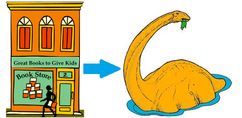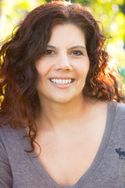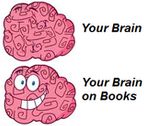
In a previous blog post, we asked whether bookstores will go the way of dinosaurs? The question is even more pressing for libraries, which face a brave new digital world...on top of state and local budget cuts.
First things first: how will libraries adapt to the growing e-book age? That question plagues both libraries and publishers as the trend to digital books shoots upward. More and more of us are turning to Kindles, Nooks, and tablets—we find a book and download it NOW! It feels so good.
But what happens when you download an e-book from the library? Do you have to stand in a virtual line for two weeks till it's your turn to download their single copy? If that's the case, bye-bye library...it's a straight shot to Amazon!
Libraries don't own e-books the same way they own book-books. They license them from publishers through distributors. So...how many times are libraries allowed by publishers to lend the same e-book (simultaneously and over time)? Only once...20 times...100...1,000 times?
Fortunately, libraries and publishers are working on a business model that will sustain them both. They may settle on a subscription fee...or a flat fee per e-book, but whatever the ultimate solution, it should allow both to survive and thrive. At least in the near term.
The long-term is murkier: are bricks & mortar libraries even necessary? If books are virtual, existing in some amorphous computing cloud, will we need never-ending rows of bookshelves? If research is done by computers, what role will reference librarians play? We can deal with those questions in another blog post. But for now, let's say that very smart people are putting their heads together on this issue, too.
The final question—budget cuts. I've got a four-letter response to that...but it's unprintable.
Here's the four-word response—change our tax system.
If we're worried about dumbing down the American mind, something's very wrong with our priorities when we reduce library funding. The world may be turning digital, but for now—and for some time in the future—libraries serve as the communal repository of knowledge...available to all comers.
See the follow-up articles: Whither Go Libraries in the Digital Age—Part 2 and Part 3.
 Are local bookstores today's literary dinosaurs? A lot of people think so...and think Amazon has all but ensured their extinction
Are local bookstores today's literary dinosaurs? A lot of people think so...and think Amazon has all but ensured their extinction
Author Richard Russo unwittingly kicked off a kerfluffle by penning a NY Times op-ed piece. He, along with some big-ticket authors (Stephen King, Ann Patchett, and Anita Shreve and others), bemoaned the fate of brick & mortar stores. For Patchett bookstores represent "a critical part of our culture." Same with Tom Perrotta, who called them part of a "vital, real-life literary culture.” What's controversial about that?
Well, hold on: a couple of days later, online Slate magazine's Farhad Manjoo weighed in, calling Russo & company's argument "bogus." Pulling no punches, here's what he said:
Russo hangs his tirade on some of the least efficient, least user-friendly, and most mistakenly mythologized local establishments you can find: independent bookstores. Russo and his novelist friends take for granted that sustaining these cultish, moldering institutions is the only way to foster a “real-life literary culture,” as writer Tom Perrotta puts it.
Ouch! That hurts. Catch the words "least user-friendly" and "cultish, moldering institutions"—bookstores, for heaven's sake! But Manjoo makes an interesting case: because of online's low prices, ease of ordering, and instant access through digital readers, people are actually reading MORE. That's real-life literary culture, he says.
As far as preserving local community culture, here's what Manjoo has to say about that:
If you’re spending extra on books at your local indie, you’ve got less money to spend on everything else—including on authentically local cultural experiences...[your] local theater company...city’s museum...locally crafted furniture.... Each of these is a cultural experience that’s created in your community. Buying Steve Jobs at a store down the street isn’t.
My smart husband Pete says that Manjoo's own argument is bogus. It's not buying books that provides a cultural experience. Russo and others are referring to the store itself—a place to gather, real people to talk to, books to touch, chairs to sit on, a friendly storefront that graces a local street.
The issue won't go away; it resurfaced the other day on NPR (6 months after Russo's NY Times piece). The announcer interviewed Manjoo and a local bookstore owner, who sadly couldn't seem to address any of Manjoo's points. All of which allows to ME to pontificate...
Who's right or wrong? It doesn't matter. The fact is that local bookstores are bordering on extinction. It. Will. Happen...at some point. The younger generation was rasied on techno-pablum; they don't get all dewey eyed over books like we do. They get their news online...play games online...connect with friends online...look up words online.... They LIVE online. It's what they've grown up with.
Bye-bye bookstores. Will we miss them? You bet—big time! Will it alter our reading habits or our literary experience? Probably not. Still, it will be a different world, and we'll all have to adjust—I don't think we'll have a choice. Sigh....
 Some years ago, when her daughter entered the fourth grade, author Tracy Carbone* became part of a Mother Daughter Book Club. I asked Tracy to share some ideas with the rest of us on how to go about starting a club for moms and their girls. So...here's Tracy!
Some years ago, when her daughter entered the fourth grade, author Tracy Carbone* became part of a Mother Daughter Book Club. I asked Tracy to share some ideas with the rest of us on how to go about starting a club for moms and their girls. So...here's Tracy!
A beautiful, poignant story, Tracy. Thanks so much for sharing it. If anyone else has been part of a mother-daughter book club...let us hear from you.Mother Daughter Book Club
Tracy L. CarboneNine years ago Lisa, the mother of one of my daughter's friends, learned she had breast cancer. Fortunately, she survived. Two years later she decided she wanted to do something special—something to create lasting memories for her oldest daughter.
So Lisa made some calls to find out who would be interested in starting a Mother Daughter Book Club. Ten of us signed on—five mothers and five daughters—all of us excited to be in such an exclusive group.
One of the first things Lisa did was to create a binder, which we used month after month...year after year. In it were the names of each month’s book, along with the five discussion questions posed by the daughter who ran that month’s meeting. Whoever ran the meeting got to host the group and choose the book for the following month. Our first book was the beloved 1945 children's classic—The Hundred Dresses by Eleanor Estes.
By the end of the girls' fourth grade year, we had read one book a month, most of them tame and friendly. But one question kept popping up, time and again: as our girls read the books and studied the plots they always asked, “Why don’t the characters just tell their parents?” We moms wondered the same thing, and their question revealed to us just how strong our bonds were with our daughters—and how our club had become a place where they could trust us.
With each book, we mothers were reminded of our own childhoods, often sharing with the group and our daughters stories no one had heard before. By the end of nearly every meeting, there were tears of joy and remembering, and heaps of sharing.
The girls matured, moving into fifth, sixth and then seventh grades. When bras and periods came into play, we moved up to books like Are You There God? It’s Me Margaret (Judy Bloom, 1970). We also combined movies with books if possible, including Because of Winn Dixie (Kate DiCamillo, 2000) and The Last Song (Nicholas Sparks, 2009), as the girls grew older.
Sadly, midway through the girls' seventh grade, Lisa’s cancer returned with a vengeance. We stepped up the meetings, choosing riskier books, teaching our girls as much about love and heartbreak and reality as we could, preparing them for the road ahead in an environment—our club—where they could feel safe.
Books like So B. It (Sarah Weeks, 2004), Jars of Glass (Brad Barkley, 2008), Hope Was Here (Joan Bauer, 2000) and Call Me Hope (Gretchen Olson, 2007) filled our shelves. These were life-affirming stories that demonstrated tenacious female characters finding strength in what remained. We read Mother-Daughter Book Club (Heather Vogel Frederick, 2007) and set up a conference call with the author, while luxuriating in an oceanfront hotel in Maine.
The five girls grew very close because of this bond. Lisa lost the battle to cancer at the beginning of the girls’ eighth grade. Though the bookclub carried on the rest of the year, by high school, the girls’ workloads were heavy and extra reading wasn’t possible.
We had a good clip though. Five years of stories of courage and love and life. I wouldn’t trade those memories for anything.
* Tracy L. Carbone is author of The Soul Collector for young readers. Check out her book on Amazon (click on the book's cover image). Also, be sure to visit her website at Tracy L. Carbone's Writing Website.
 Now we know why we're hung up on reading. We talk about the guilty pleasures of the novel, of being sucked into a story, but it turns out we have an excuse. Lucky us—we're actually hard wired to respond to fiction.
Now we know why we're hung up on reading. We talk about the guilty pleasures of the novel, of being sucked into a story, but it turns out we have an excuse. Lucky us—we're actually hard wired to respond to fiction.
If a character in a book walks across a room to close a window, the brain's motor cortex—the part that directs our physical action—lights up. It's as if we, not the character, got up out of our chair to close the window. More suprising, the motor cortex region associated with leg movement and another with arm movement both light up.
But wait! There's more! When scents or textures are described, our brain's olfactory and sensory regions kick in. So "her skin was smooth as silk" elicits a more powerful brain response than "she had lovely skin." High-five for metaphors.
We've long intuited that literature allows us to transcend our own skin (speaking of skin) and experience, from the inside out, how someone else views the world. And guess what...brain studies confirm it.
It turns out people who read are more empathetic, with a higher proclivity for understanding different viewpoints. This cause-and-effect relationship holds true even when taking into account that people who empathize might be more inclined to read than those who don't.
Be sure to read the fascinating article by Annie Murphy Paul: New York Times, March 12, 2012. It's good reading...will light up your brain!

Overheard at a party:
"What do you do?" he asks.
"I'm a writer," she says.
"Would I have heard of you?"
So she tells him her name.
No recognition.
"I write about families, marriage, sex, and desire," she adds.
"Oh, wait,"he says. "Lemme get my wife—SHE READS THOSE KIND OF BOOKS."
True story as told by author Meg Wolitzer in a NY Times Book Review essay. Wolitzer is a fine author with a string of highly regarded books to her name.
Her beef isn't that the man didn't know her name (she's not a celebrity writer) it's that he's a stand-in for most male readers, who don't value novels about marriage and family.
But then neither do the literati, Wolitzer argues, who typically ignore "relationship books"—unless those books are written by men.
She points to the shower of FAME & ACCLAIM poured down on Jeffrey Eugenides for The Marriage Plot and Jonathan Franzen for both Corrections and Freedom—all books centered around love, marriage, and family. The two authors romp in the same territory as female authors, but they get all the kudos.
Remember the dust-up between Oprah and Jonathan Franzen? In 2001 Oprah selected Corrections as one of her book club picks, but Franzen demurred… with an unfortunate comment: if his book became An Oprah Selection, no man—NO MAN!!!—would touch it. Oprah withdrew her Seal of Approval (only to bestow it 10 years later for Franzen's 2011 novel, Freedom).
I've written about this subject before, and shame on me. I was TIRED of all those intimate portraits of troubled families—you're always waiting for the next SHOE TO DROP… then the next… and the next …and eveyone's miserable …all the time. Men seem to use a larger canvas, resulting in books with more heft.
I feel like a traitor to my sex… especially because Meg Wolitizer reminded us of female authors who explore some daring territory:
—Jennifer Egan (A Visit by the Goon Squad)
—Karen Russell (Swamplandia!)
—Tea Obreht (The Tiger's Wife). Let's also add…
—A.S. Byatt (everything)
—Hilary Mantel (Wolf Hall and Bring Up the Bodies)
—Anne Patchett (State of Wonder)
—Zadie Smith (White Teeth)… And all that's just for starters.
Anyway, do read Meg Wolitizer's piece. It's thought provoking—with lots to talk about for any book group, especially a co-ed club.

